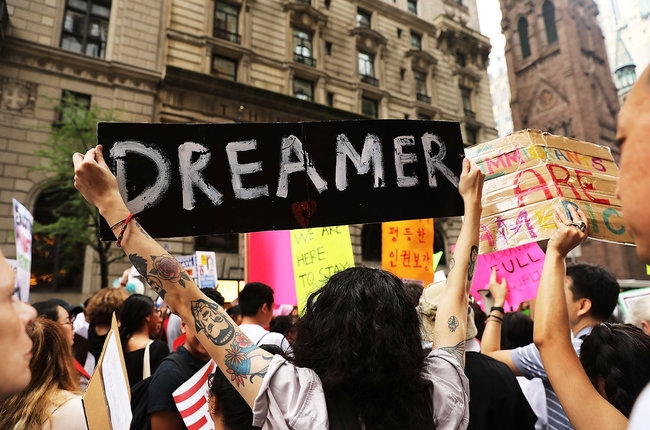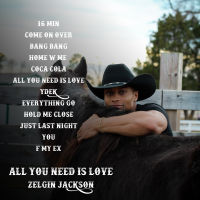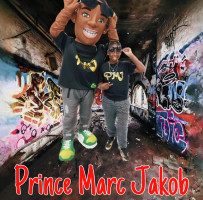There are nearly 800,000 people lawfully living in the United States under the DACA (Deferred Action for Childhood Arrivals), which was put into effect in 2012. With the help of the Mark Zuckerberg-backed immigration reform organization, FWD.us, some 100 of these “dreamers” descend on Washington today Wed., Oct. 4, to tell their individual stories to Congress and make the case for expedient legislative action after President Trump ordered an end to DACA by March 5, 2018.
One of those in attendance will be music producer, mixer and engineer Andreas Magnusson, who was just a toddler when he arrived in the US in the arms of his undergraduate mom, who came to the America from Sweden to study and ended up marrying and making a life here.
Demi Lovato, John Mayer, Barack Obama & More React to Trump DACA 'Wind Down'
Now 35, the founder of Planet Red studios in Richmond, Virginia—who’s worked with noted death metal bands like The Black Dahlia Murder and Warped Tour acts such as Fit For A King—spoke with Billboard about his “dream job” and all-American life—and all that he stands to lose if Congress doesn’t hammer out legislation on behalf of him and all of the other hundreds of thousands of dreamers. Below is Magnusson's story.

In 2012, when President Obama enacted DACA, I was one of the first to get my application in. It was just a whole lot of bad luck that made me end up on DACA. I came to the US from Sweden in 1985 with my mom when I was three years old. She came here to go to college, went on to get her Master’s degree, and decided that she wanted to continue living here. She’s a computer systems analyst and got her H1-B visa through her employer. It’s about a 10-12 year process to get a green card that way, and it extends to children of the H1-B visa holders. When I was 23, just when we were going to get the green card, we found out that it had been denied. During the time with her employer, they had hired an immigration lawyer who did all of our filings, and at some point there was a lapse in paper work and something had expired. At that point, my mom was married to an American who she had two kids with, so she immediately re-filed with her husband as the sponsor. Because I was over the age of 21 by then, I couldn’t get filed with her. When the green card application got denied, I became illegal—after over 20 years of being here completely legally, doing everything right, even having an immigration lawyer that was supposed to be taking care of everything. In one phone call, I was illegally here in the country.
During that time of being illegal, my grandfather died in Sweden and I couldn’t go to the funeral. Had I left, I wouldn’t have been able to show that I had any right to come back into the country. And when my driver’s license expired, I was unable to get a new one until DACA was enacted.
I grew up completely American. I have pictures of me growing up, playing football, baseball, basketball—the typical American life. If you met me, you would not know that I was not American. If they don’t come up with a legislative solution, I take the risk in 2019 when my DACA paperwork expires, of being deported to a country where I can speak Swedish at the vocabulary and grammar level of a 10- or 12-year-old; I can’t read or write it, because I never went to school there.
I never chose to come here. I came here when I was three years old, with my mom, and over time I’ve made a life that really is the American dream: I work for myself, I own a home, I own a car. The work that I do—producing, and now mixing and engineering records—is my exact dream job from when I was 12 years old. My work, my career, my house—things in life that I have worked very hard for many years to achieve—I would stand to possibly lose all of that.
My story is a little atypical from what people may think of as the typical DACA recipient, but I’ve talked to so many different recipients and lots of people have atypical stories. There are actually 800,000 individual stories that show different examples of how the system isn’t working correctly. My main thing to show is that there are so many different tragic stories and so many people that have so much to lose, and these are good, hard-working people; they have some form of education here, even though they don’t have legal records, they pay taxes and they get nothing back from the system.
I’ve had so many Trump supporters that are usually opposed to DACA who I’ve talked to and when I tell them my story, they feel sorry for me, “yeah, that’s so bad—they need to fix things!” Their viewpoint is definitely racially biased in that nobody has a problem with me being here, because I'm white. But I was technically here illegally, just like the rest of the DACA recipients.
Whether we came here legally or illegally, we all came here with no choice of our own. And we’ve all made our lives here. I don’t remember coming here. And it’s safe to assume most other DACA recipients don’t either. This is where all of my memories are from. My only memories of Sweden are those of a tourist, going to visit family there. But technically, because that’s the country that’s on my passport, if they don’t come up with something for me, I take the risk of having to go back to that country where I don’t really understand the culture. I’m American. The Dream Act would give all of us a system to establish permanent residency and ultimately citizenship here. I plan to live here forever. I’m politically aware and I want to be able to vote. I want to have a say in the country that I live in.








